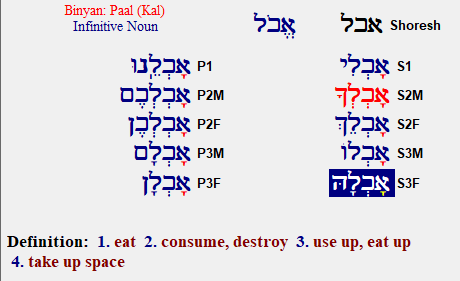Why did Moses used 2 different words in Genesis 6:21 when writing about the food Noah was to bring aboard the Ark?
The first one is "maakal" meaning "food". The next one is "okleh" meaning "food for eating/consumption".
Why did Moses used 2 different words in Genesis 6:21 when writing about the food Noah was to bring aboard the Ark?
The first one is "maakal" meaning "food". The next one is "okleh" meaning "food for eating/consumption".
They are different forms of the same word.
"maakal" מַֽאֲכָל is the Pual (passive intensive) participle noun of "to eat" אכל.
It means things to be eaten.
"okleh" אָכְלָֽה is the 3rd person singular feminine infinitive noun of the same root "to eat" אכל.
This word has the lamed prefix on it which means "for".
So it means "for eating".
So the entire verse says:
And you take to yourself of all things to be eaten, which one may eat, and gather it to you that it may become for you and for them for eating.
So there are not 2 types of food here.
ref: I used a verb table program called Saffa HebrewWorks to get the above derivations from the root.
It's easier for me to quote Klein's "A Comprehensive Etymological Dictionary of the Hebrew Language for Readers of English":
מַֽאֲכָל formed from אכל (=to eat) with prefix מ
אָכְלָֽה feminine noun. eating. food. [Properly infinitive of אכל (=he ate)]
Yes please do so. I am VERY interested. Does it have an online version like Strong's Concordance? That's what I've been using for the last 5 years in studying the Word. Found it really helpful. – Philip yesterday
Here is the output screen from Saffa for אכלה

Here you see that the binyan (verb form) is Paal, also called Kal or Qal.
It is the basic form of the verb.
We don't have the concept of binyan in English.
In English we would have to use many different verbs, but in Hebrew it is different binyans of the same verb root.
For info on binyans:
https://en.wikipedia.org/wiki/Modern_Hebrew_verb_conjugation#Binyanim_or_conjugations
and scroll down to Binyanim
Then you see that these are the infinitive noun forms.
The infinitive noun is the verb as a process. So here it would be eating.
The conjugation of the infinitive noun is very simple.
It conjugates like a noun.
It just can have different possessive pronoun suffixes.
So in our case you see the exact form is the 3rd person feminine singular, meaning "her eating", or "each one's eating".
I do not know why the feminine singular is used. Maybe to indicate the individual care and gentleness of the feeding.
notice here that the binyan is Pual, which is the passive intensive.
It is described in the binyanim link I gave earlier.
(I previously said it was the Hufal form. That was a mistake. The participles are spelled the same for both, but the meaning is different.)
You will see that the form we have in Gen 6:21 is what Saffa calls Present Singular Masculine. This is how the form is used in Modern Hebrew. It is actually the participle.
In Biblical Hebrew, the participle is a noun meaning the person doing the action.
Since the verb is passive, it means the thing to be consumed, which is food.
Strongs is useful for nouns. For verbs it is only useful if it separates the definitions by binyan. Otherwise you may think you can use the passive meaning when the verb in the verse you are looking at is causative.
There are many verb tables online
Here is one
http://conjugator.reverso.net/conjugation-hebrew.html
I haven't seen one that has the infinitive nouns.
This may be because the infinitive noun is very easy to conjugate yourself.
Do not trust the verb meaning given in these verb tables.
The meanings may come from Modern Hebrew.
While the word מאכל related to food products combined to something that is edible (that someone make action on them like boiled or cooked or fried it to make food), the noun אוכל is generic term to all kind of food products (vegetable fruits).
The closest translation can be the difference between meal and food.
Maybe the use of both terms suggest that Noah took not just food products but also home-made food.
*this answer relied on my Hebrew knowing